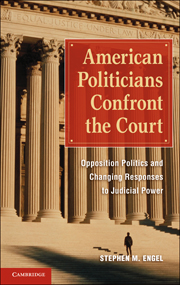 American Politicians Confront the Court
American Politicians Confront the Court Undermining the Court in an Anti-Party Age
Published online by Cambridge University Press: 05 June 2012
The Jeffersonian assault on judicial authority was grounded in civic republican ideas that did not grant the validity of dissenting views on constitutional meaning and thus did not acknowledge the legitimacy of opposition. Additional telltale characteristics of the republican idiom were made manifest during these years including rhetoric of a substantive and identifiable common good and conflation of political opposition with anti-constitutional conspiracy. Notwithstanding images of separate institutional powers checked and balanced against one another, the Founding generation expected the federal judiciary to be part of a unified governing regime, which served an identified common good and which was guided by a Constitution of fixed and discoverable meaning. If anything, Jeffersonians (or Republicans as they came to identify themselves) were more insistent on this point than Federalists. They could not conceive of a legitimate federal government in which the different branches would act on competing principles since they considered those principles to be “immutably fixed” by a written Constitution approved by the people themselves. As such, many Jeffersonians considered the practice of constitutional interpretation to be illegitimate and to signal a move away from the Framers' limited intentions for national power; as one member of Congress put it during early debates on establishing a national bank, “We have already gone much too far in explaining the constitution; and if we continue on the same plan, there is a danger that we shall at length persuade ourselves, that every power which is not expressly refused is given to us.”
To save this book to your Kindle, first ensure no-reply@cambridge.org is added to your Approved Personal Document E-mail List under your Personal Document Settings on the Manage Your Content and Devices page of your Amazon account. Then enter the ‘name’ part of your Kindle email address below. Find out more about saving to your Kindle.
Note you can select to save to either the @free.kindle.com or @kindle.com variations. ‘@free.kindle.com’ emails are free but can only be saved to your device when it is connected to wi-fi. ‘@kindle.com’ emails can be delivered even when you are not connected to wi-fi, but note that service fees apply.
Find out more about the Kindle Personal Document Service.
To save content items to your account, please confirm that you agree to abide by our usage policies. If this is the first time you use this feature, you will be asked to authorise Cambridge Core to connect with your account. Find out more about saving content to Dropbox.
To save content items to your account, please confirm that you agree to abide by our usage policies. If this is the first time you use this feature, you will be asked to authorise Cambridge Core to connect with your account. Find out more about saving content to Google Drive.